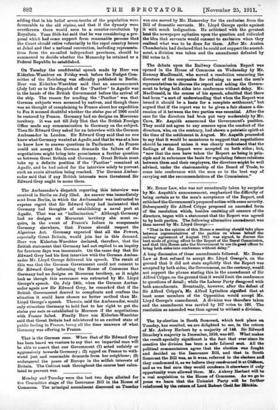Mr. Bonar Law, who was not unnaturally taken by surprise
by Mr. Asquith's announcement, emphasized the difficulty of being certain as to the men's acceptance of the Report, and criticised the Government's proposed action with some severity.
Subsequently Sir Alfred Cripps proposed an amended form of the resolution which, besides omitting all censure of the directors, began with a statement that the Report was agreed to by both parties. The following alternative amendment was then moved by Mr. Lloyd George :—
" That in the opinion of this House a meeting should take place between representatives of the parties on whose behalf the railway agreement of August 1911 was signed, to discuss the best mode of giving effect to the Report of the Royal Commission, and that this House asks the Government to use its good offices to bring both sides into conference without delay."
A long discussion of these amendments followed. Mr. Boner Law at first refused to accept Mr. Lloyd George's, on the ground that it did not state explicitly that the Report was accepted by both sides; the Government, on the contrary, would not support the phrase stating this in the amendment of Sir Alfred Cripps, on the ground that. it would limit the conference to questions of detail ; while the Labour Party disagreed with both amendments. Eventually, however, after the defeat of Sir Alfred Cripps's, Mr. Alfred Lyttelton signified that at least some members of the Opposition would accept Mr. Lloyd George's amendment. A division was therefore taken and the amendment was carried by 167 votes to 108. The resolution as amended was then agreed to without a division.


















































 Previous page
Previous page